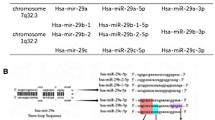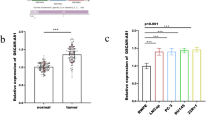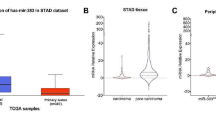Abstract
Increasing evidence indicates that abnormal microRNA (miRNA) expression is related to hepatocellular carcinoma (HCC) development. Our study aimed to elucidate the essential role of miR-329 in HCC progression. Real-time PCR was used to analyze miR-329 and bromodomain containing 4 (BRD4) expression in HCC samples (n = 135). Cell Counting Kit-8 (CCK-8) and flow cytometric analysis were used to investigate cell proliferation and apoptosis. The transwell assay was used to examine the cell invasive ability. The regulation mechanism was confirmed by luciferase reporter and western blot assays. Kaplan-Meier analysis was used to detect the function of miR-329 on the prognosis of HCC patients. miR-329 was decreased in HCC samples and was related to tumor development. Furthermore, miR-329 significantly regulated cell invasion by targeting BRD4 but had no effect on cell proliferation and apoptosis. Moreover, downregulation of miR-329 predicted poor prognosis of HCC patients. miR-329 could control cell invasion via regulating BRD4 expression and may be a prognostic marker in HCC.




Similar content being viewed by others
Abbreviations
- BRD4:
-
Bromodomain containing 4
- HCC:
-
Hepatocellular carcinoma
- UTR:
-
Untranslated region
- siRNA:
-
Small interfering RNA
- CCK-8:
-
Cell Counting Kit-8
References
Esquela-Kerscher A, Slack FJ. Oncomirs—micrornas with a role in cancer. Nat Rev Cancer. 2006;6:259–69.
Hanahan D, Weinberg RA. Hallmarks of cancer: the next generation. Cell. 2011;144:646–74.
Yang XW, Shen GZ, Cao LQ, Jiang XF, Peng HP, Shen G, et al. Microrna-1269 promotes proliferation in human hepatocellular carcinoma via downregulation of foxo1. BMC Cancer. 2014;14:909.
Zhou J, Lu S, Yang S, Chen H, Shi H, Miao M, et al. Microrna-127 post-transcriptionally downregulates sept7 and suppresses cell growth in hepatocellular carcinoma cells. Cell Physiol Biochem. 2014;33:1537–46.
Li H, Li Y, Liu D, Sun H, Liu J. Mir-224 is critical for celastrol-induced inhibition of migration and invasion of hepatocellular carcinoma cells. Cell Physiol Biochem. 2013;32:448–58.
Bartel DP. Micrornas: genomics, biogenesis, mechanism, and function. Cell. 2004;116:281–97.
Xiao B, Tan L, He B, Liu Z, Xu R. Mirna-329 targeting e2f1 inhibits cell proliferation in glioma cells. J Transl Med. 2013;11:172.
Yang H, Li Q, Zhao W, Yuan D, Zhao H, Zhou Y. Mir-329 suppresses the growth and motility of neuroblastoma by targeting kdm1a. FEBS Lett. 2014;588:192–7.
El-Serag HB, Rudolph KL. Hepatocellular carcinoma: epidemiology and molecular carcinogenesis. Gastroenterology. 2007;132:2557–76.
Perz JF, Armstrong GL, Farrington LA, Hutin YJ, Bell BP. The contributions of hepatitis b virus and hepatitis c virus infections to cirrhosis and primary liver cancer worldwide. J Hepatol. 2006;45:529–38.
Prete SD, Montella L, Caraglia M, Maiorino L, Cennamo G, Montesarchio V, et al. Sorafenib plus octreotide is an effective and safe treatment in advanced hepatocellular carcinoma: Multicenter phase II so.LAR. study. Cancer Chemother Pharmacol. 2010;66:837–44.
Montella L, Addeo R, Caraglia M, Faiola V, Guarrasi R, Vincenzi B, et al. Vascular endothelial growth factor monitoring in advanced hepatocellular carcinoma patients treated with radiofrequency ablation plus octreotide: a single center experience. Oncol Rep. 2008;20:385–90.
Colombino M, Sperlongano P, Izzo F, Tatangelo F, Botti G, Lombardi A, et al. Braf and pik3ca genes are somatically mutated in hepatocellular carcinoma among patients from south Italy. Cell Death Dis. 2012;3:e259.
Wang YH, Sui YN, Yan K, Wang LS, Wang F, Zhou JH. Brd4 promotes pancreatic ductal adenocarcinoma cell proliferation and enhances gemcitabine resistance. Oncol Rep. 2015;33:1699–706.
Hu Y, Zhou J, Ye F, Xiong H, Peng L, Zheng Z, et al. Brd4 inhibitor inhibits colorectal cancer growth and metastasis. Int J Mol Sci. 2015;16:1928–48.
Zhang P, Dong Z, Cai J, Zhang C, Shen Z, Ke A, et al. Brd4 promotes tumor growth and epithelial-mesenchymal transition in hepatocellular carcinoma. Int J Immunopathol Pharmacol. 2015;28:36–44.
Huang D, Du X, Yuan R, Chen L, Liu T, Wen C, et al. Rock2 promotes the invasion and metastasis of hepatocellular carcinoma by modifying mmp2 ubiquitination and degradation. Biochem Biophys Res Commun. 2014;453:49–56.
Stiuso P, Potenza N, Lombardi A, Ferrandino I, Monaco A, Zappavigna S, et al. Microrna-423-5p promotes autophagy in cancer cells and is increased in serum from hepatocarcinoma patients treated with sorafenib. Mol Ther Nucleic Acids. 2015;4:e233.
Vaira V, Roncalli M, Carnaghi C, Faversani A, Maggioni M, Augello C, et al. Microrna-425-3p predicts response to sorafenib therapy in patients with hepatocellular carcinoma. Liver Int. 2015;35:1077–86.
Shi L, Zhang S, Wu H, Zhang L, Dai X, Hu J, et al. Mir-200c increases the radiosensitivity of non-small-cell lung cancer cell line a549 by targeting vegf-vegfr2 pathway. PLoS One. 2013;8, e78344.
Lewis H, Lance R, Troyer D, Beydoun H, Hadley M, Orians J, et al. Mir-888 is an expressed prostatic secretions-derived microrna that promotes prostate cell growth and migration. Cell Cycle. 2013;13.
Kim J, Wu L, Zhao JC, Jin HJ, Yu J. Tmprss2-erg gene fusions induce prostate tumorigenesis by modulating microrna mir-200c. Oncogene. 2013.
Akanuma N, Hoshino I, Akutsu Y, Murakami K, Isozaki Y, Maruyama T, et al. Microrna-133a regulates the mrnas of two invadopodia-related proteins, fscn1 and mmp14, in esophageal cancer. Br J Cancer. 2013.
Yu X, Li H, Jiang X, Guo L, Jiang W, Lu SH. Mir-203 inhibits the proliferation and self-renewal of esophageal cancer stem-like cells by suppressing stem renewal factor bmi-1. Stem Cells Dev. 2013.
Li Z, Yu X, Wang Y, Shen J, Wu WK, Liang J, et al. By downregulating tiam1 expression, microrna-329 suppresses gastric cancer invasion and growth. Oncotarget. 2014.
Acknowledgments
Thanks to Dr. Junwei Tang (The First Affiliated Hospital of Nanjing Medical University, Nanjing, China) for providing the HCC samples and cell lines.
Compliance with ethical standards
ᅟ
Conflicts of interest
None
Ethics approval and consent to participate
The informed consent approval from The First Affiliated Hospital of Nanjing Medical University Institute Research Ethics Committee was obtained.
Author information
Authors and Affiliations
Corresponding author
Additional information
Jianping Zhou and Weiling Li contributed equally to this work.
Rights and permissions
About this article
Cite this article
Zhou, J., Li, W., Guo, J. et al. Downregulation of miR-329 promotes cell invasion by regulating BRD4 and predicts poor prognosis in hepatocellular carcinoma. Tumor Biol. 37, 3561–3569 (2016). https://doi.org/10.1007/s13277-015-4109-4
Received:
Accepted:
Published:
Issue Date:
DOI: https://doi.org/10.1007/s13277-015-4109-4




